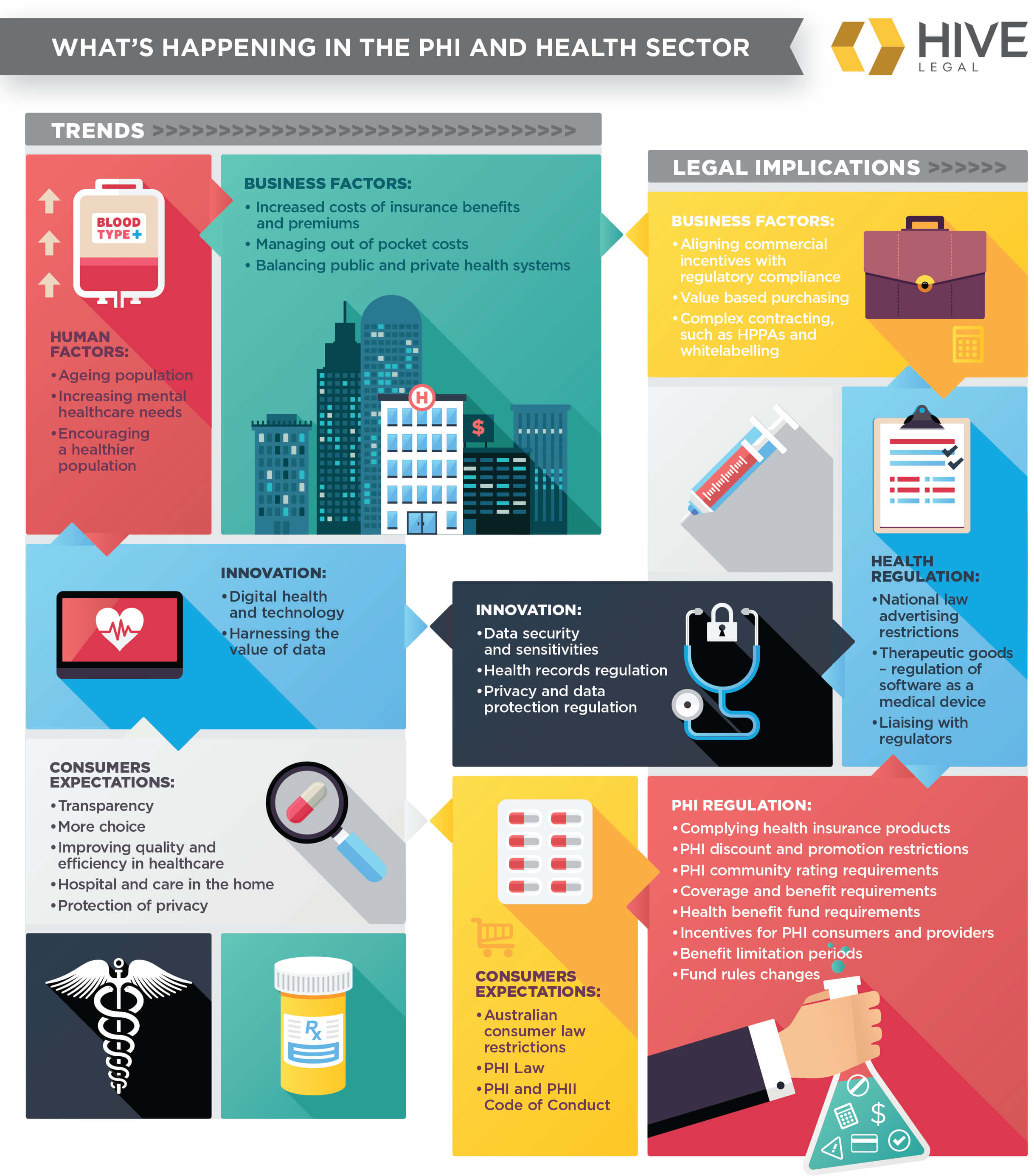On 5th and 6th June, Joanna Green, Ella Cannon and Adrienne Trumbull from our Health Team attended the Informa Health Insurance Summit in Sydney. The Summit involved high profile speakers from across the industry and was well attended by private health insurers, hospitals, Government and industry bodies. Here is a summary of the key discussions.
Key issues
Many speakers highlighted the challenging environment that the current climate provides for the PHI industry. This included affordability, transparency and value issues such as:
- the decline in younger members, together with the increase of an older and sicker population that has access to more tailored and expensive treatments;
- a shift in claim types for younger members, including a rise in mental health claims and a lower number of people taking up insurance early for the purposes of obstetrics;
- the shrinking gap between the quality and choice between private and public hospitals;
- trends in low value care; and
- variance in medical costs, quality, experience and outcomes between doctors and hospitals, and issues in members accessing and understanding quality benchmarking data prior to establishing the clinical relationship. Websites including HealthShare and WhiteCoat were recognised for their impact in this area.
Hot topics
Private patients in the public system.
Joanna Green, Principal at Hive Legal, led a panel discussion between Jacqueline Worsley (Executive Director of Government Relations NSW Health), Professor Brendan Murphy (Chief Medical Officer, Commonwealth Department of Health) and CEO of Independent Hospital Pricing Authority, James Downie on this sensitive topic, with the take away being there is no clear path forward. Some speakers noted the importance of the dual public/private health system and the dramatic increase in waitlist times that would occur if all patients went via the public system. Others noted the importance of choice and the high standard of newly built public hospitals meaning there may not be the same value proposition for private patients as there once was. The methodology and timing for asking private patients to make the election was also discussed. We will publish a more in depth piece on this issue shortly.
Member data.
We heard from several speakers about the significant opportunities of data, but also the difficulty of navigating member concerns around how their data will be used, and the security of that data. Ella Cannon, Senior Associate of Hive Legal, reiterated her views that authenticity and transparency will be increasingly important for insurers in communicating how member data will be captured and used so as to increase comfort levels in sharing this data, which doesn’t always have to involve boring privacy policies!
Focus going forward
- Low premium increases: While the mood across the industry was generally one of relief that the Labor government would not be implementing the promised 2% cap, several speakers noted the Morrison Government’s focus on delivering low premium increases without impacting value for the customer. Affordability is a key focus for stakeholders, with suggestions to address including changes to the rebate, prosthesis procurement, second tier default benefits, right setting for health care and low value care.
- Delivering value: The buzz word of the Summit was “value”. The industry is challenged to move the member focus away from how expensive PHI is, and towards the value that they are getting for that expense.
- Good governance: APRA was strong in its message to insurers to ‘be prepared’. It wants insurers to focus on risk management, and in particular look at its board composition to ensure it is refreshed, and has a variety of backgrounds and skills to enable it to best manage risks. It was also made clear that following the recent focus on the banking sector, the PHI sector should expect more attention in coming years, and as such, should have a strict compliance approach. APRA also expects insurers to have robust management strategies in place to mitigate extraneous risks, such as policy change risk, substitute services, health and wellbeing offerings, engagement with policy makers and implementation of redundancy options such as mergers with aligned partners.
If you would like further information or have any questions, please contact us.
This is for general information only and formal legal advice should be sought on matters of interest arising from this article.

Email: [email protected]
Mobile: +61 413 336 990

Email: [email protected]
Mobile: +61 431 270 591

Email: [email protected]
Mobile: +61 419 437 567
